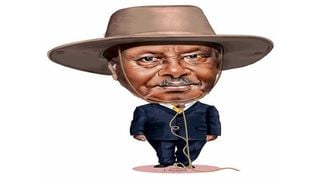
President Yoweri Museveni.
| Nation Media GroupAfrica
Premium
Museveni or Wine? Ugandans go to polls clouded by violent campaigns
What you need to know:
- Incidents of murder, abduction and arbitrary arrests have intensified in recent weeks.
- On Friday, 90 supporters of the National Unity Party were arraigned before the military court martial on charges of possession of weapons.
At an inter-denominational gathering on the outskirts of Kampala on January 4, members of the clergy were left embarrassed when a flock of doves they had released in a symbolic gesture of peace refused to go aloft.
As the feathered friends tumbled to the ground one after another, social media was immediately awash with what this meant for the presidential and parliamentary polls due Thursday.
The event highlighted the atmosphere of foreboding as Ugandans go to vote in one of the tensest polls since 1980. Incidents of murder, abduction and arbitrary arrests have intensified in recent weeks.
On Friday, 90 supporters of the National Unity Party were arraigned before the military court martial on charges of possession of weapons. They were arrested as they accompanied their presidential candidate to the island district of Kalangala a fortnight ago.
Since campaigns officially opened last November, nearly 70 people have lost their lives in election-related violence. Fifty-four of the deaths occurred over two days of violence in the capital, following the arrest on November 18, of musician turned politician Robert Kyagulanyi Ssentamu aka Bobi Wine, on charges of violating Covid-19 prevention guidelines.
The spiral of violence has caught the attention of the UN Commissioner for Human Rights.
“We are deeply concerned by the deteriorating human rights situation in Uganda ahead of parliamentary and presidential elections scheduled for 14 January and the challenges this situation may pose not only for voting day itself, but also for the post-electoral period,” spokesperson Ravina Shamdasani said in statement on Friday.
Arbitrary arrests
“The harassment, ill-treatment, arbitrary arrests and detention of opposition candidates and supporters have been a worrying development during the electoral campaign. Kyagulanyi, the candidate of the National Unity Platform (NUP), has been blocked from holding campaign activities several times. Among recent incidents, Oboi Amuriat, the presidential candidate of the Forum for Democratic Change (FDC), was arrested on January 2 as he was campaigning in Nakasongola District and released on bail later the same afternoon. Journalists covering his campaign were reportedly beaten by security forces and ordered to delete videos and photos,” Shamdasani observed.
She further said the commissioner was concerned that measures to contain the spread of Covid-19 were being used to restrict public freedoms and political participation during the electoral process.
“We are also concerned that the discriminatory enforcement of such restrictions has led to violence, arbitrary arrests and detention, and, in some instances, reports of torture and ill-treatment by security forces,” she added.
Although there are 11 candidates on the ballot, the contest has narrowed down to Mr Kyagulanyi 38, and 76-year-old incumbent Yoweri Museveni who has been at the helm since 1986.

Ugandan opposition presidential candidate Robert Kyagulanyi Ssentamu aka Bobi Wine.
Museveni is campaigning on a ticket of continuity, citing a track record of social and economic transformation, while Kyagulangi is championing change, accusing the incumbent of corruption and squandering the country’s opportunities.
Both contenders are fighting for the hearts of the youth who constitute 41 per cent of all voters. Kyagulanyi is promising them ownership of the country while Museveni must convince them that he will deliver better on job creation.
It is a tall order for the incumbent. Improved child survival rates have seen population growth overtake economic growth. The World Bank estimates that Uganda needs sustained annual GDP rates of 7 per cent for 10 years but the economy has struggled in recent years.
Kyagulanyi has not articulated how he will go about delivering on his promises but it does not seem to matter to his supporters.
Museveni calls Kyagulanyi a stooge of Western gay groups whom he accuses of funding his campaign. This week, he deployed sections of the army to take over security in Kampala ahead of the polls.
Set Kampala aflame
Without revealing details, he claimed security agencies had uncovered a plot by opposition elements to set Kampala aflame, if they lost the election.
Mr Crispin Kaheru Kaheru, an independent election observer and member of the Citizens Coalition for Electoral Democracy CCEDU, says the threat of violence cannot be underrated given the events in the run up to this year’s polls.
“The fact that we have not seen this magnitude of violence prior to polling day raises a lot tension. We cannot underestimate the worries given what we have seen in the past three weeks,” he told the Sunday Nation.
Kaheru said there should be shared responsibility and accountability for electoral violence because some of it has been provoked by the security agencies, the candidates or their supporters.
For months now, Mr Museveni and the police have been driving a narrative of violence. Along the campaign trail, violent confrontations between police and opposition supporters have often broken as the latter blocked opposition gatherings.
In some instances, Kyagulanyi and his entourage have been blocked from accessing radio stations and hotel accommodation upcountry.
The actions of the security forces have blurred the line between the record of Uganda’s past leaders, whom Museveni has derisively called ‘swine’ and the unrestrained violence by his own security forces.
On Friday, Inspector-General of Police Okoth Martin Ochola caused a stir when he said he would not apologise for police beatings of journalists.
“We are beating journalists to restrain them from going where there is danger. When a police officer tells you to stop, you must stop for your own safety. I won’t apologise for police actions,” Ochola said in remarks seen as endorsing police brutality against unarmed civilians.




